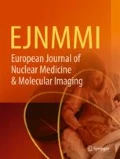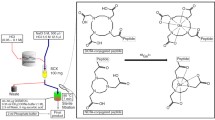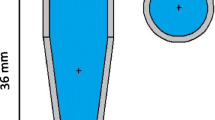Abstract
Purpose
A new field of interest is the application of 68Ga-labelled DOTA-conjugated peptides for positron emission tomography (PET). The commercially available or house-made generators require time-consuming and tedious handling of the eluate. Radiolabelling at high specific activities without further purification is not possible, while high specific activities are necessary for peptides that potentially display pharmacological side-effects. Here we present the practical aspects and the results of radiolabelling DOTA-peptides with a TiO2-based commercially available 68Ge/68Ga generator.
Methods
Reaction kinetics and parameters influencing the incorporation of the radionuclide at the highest achievable specific activity were investigated. Since high finger doses were anticipated during handling of the high beta-energy emitter 68Ga, finger dosimetric measurements were performed during radiolabelling and in vivo administration.
Results
Fractionated elution of the generator revealed that 80% of the radioactivity was recovered in 1 ml. Bi- and trivalent ionic contaminants that compete for the incorporation of the radionuclide were below 50 nM; thus further tedious and time-consuming purification was avoided. Radiolabelling was performed at pH 3.5–4. Plastic shielding (≥7-mm wall thickness) around the syringe during administration effectively eliminated the positrons. In rats 68GaCl3 had slow clearance from blood, while 68Ga-EDTA was rapidly cleared via the kidneys. Uptake of 68Ga-DOTATOC in somatostatin receptor-positive tissues was high, with no significant difference between 1 and 4 h post injection.
Conclusion
DOTA-peptides for PET imaging can be labelled with 68Ga up to specific activities of 1 GBq per nmol within 20 min, enabling the clinical application of peptides that display potential pharmacological side-effects.




Similar content being viewed by others
References
Bodei L, Cremonesi M, Zoboli S, Grana C, Bartolomei M, Rocca P, et al. Receptor-mediated radionuclide therapy with 90Y–DOTATOC in association with amino acid infusion: a phase I study. Eur J Nucl Med Mol Imaging 2003;30:207–16.
Otte A, Jermann E, Behe M, Goetze M, Bucher HC, Roser HW, et al. DOTATOC: a powerful new tool for receptor-mediated radionuclide therapy. Eur J Nucl Med 1997;24:792–5.
Breeman WAP, de Jong M, Kwekkeboom DJ, Valkema R, Bakker WH, Kooij PP, et al. Somatostatin receptor-mediated imaging and therapy: basic science, current knowledge, limitations and future perspectives. Eur J Nucl Med 2001;28:1421–9.
Breeman WAP, de Jong M, Erion JL, Bugaj JE, Srinivasan A, Bernard BF, et al. Preclinical comparison of 111In-labeled DTPA- or DOTA-bombesin analogs for receptor-targeted scintigraphy and radionuclide therapy. J Nucl Med 2002;43:1650–6.
Chinol M, Bodei L, Cremonesi M, Paganelli G. Receptor-mediated radiotherapy with Y-DOTA-DPhe-Tyr-octreotide: the experience of the European Institute of Oncology Group. Semin Nucl Med 2002;32:141–7.
de Jong M, Breeman WAP, Bernard BF, Bakker WH, Visser TJ, Kooij PP, et al. Tumor response after [90Y-DOTA0,Tyr3]octreotide radionuclide therapy in a transplantable rat tumor model is dependent on tumor size. J Nucl Med 2001;42:1841–6.
Hofmann M, Maecke H, Borner R, Weckesser E, Schoffski P, Oei L, et al. Biokinetics and imaging with the somatostatin receptor PET radioligand 68Ga-DOTATOC: preliminary data. Eur J Nucl Med 2001;28:1751–7.
Kowalski J, Henze M, Schuhmacher J, Macke HR, Hofmann M, Haberkorn U. Evaluation of positron emission tomography imaging using [68Ga]-DOTA-D Phe1-Tyr3-Octreotide in comparison to [111In]-DTPAOC SPECT. First results in patients with neuroendocrine tumors. Mol Imaging Biol 2003;5:42–8.
Henze M, Schuhmacher J, Hipp P, Kowalski J, Becker DW, Doll J, et al. PET imaging of somatostatin receptors using [68Ga]DOTA-d-Phe1-Tyr3-Octreotide: first results in patients with meningiomas. J Nucl Med 2001;42:1053–6.
Froidevaux S, Eberle AN, Christe M, Sumanovski L, Heppeler A, Schmitt JS, et al. Neuroendocrine tumor targeting: study of novel gallium-labeled somatostatin radiopeptides in a rat pancreatic tumor model. Int J Cancer 2002;98:930–7.
Heppeler A, Froidevaux S, Eberle AN, Maecke HR. Receptor targeting for tumor localisation and therapy with radiopeptides. Curr Med Chem 2000;7:971–94.
Heppeler A, Froidevaux S, Maecke HR, Jermann E, Behe M, Powell P, et al. Radiometal labelled macrocyclic chelator derivatised somatostatin analogue with superb tumour targeting properties and potential for receptor mediated internal radiotherapy. Chem Eur J 1999;5:1974–81.
Green MS, Welch MJ. Gallium radiopharmaceutical chemistry. Int J Rad Appl Instrum B 1989;16:435–48.
Moerlein SM, Welch MJ. The chemistry of gallium and indium as related to radiopharmaceutical production. Int J Nucl Med Biol 1981;8:277–87.
Loc’h C, Maziere B, Comar D. A new generator for ionic gallium-68. J Nucl Med 1980;21:171–3.
Hnatowich DJ. A review of radiopharmaceutical development with short-lived generator-produced radionuclides other than 99mTc. Int J Appl Radiat Isot 1977;28:169–81.
Hnatowich DJ. Review of 68Ga chemical and imaging studies at the MGH. Prog Nucl Med 1978;4:113–7.
Meyer GJ, Macke H, Schuhmacher J, Knapp WH, Hofmann M. 68Ga-labelled DOTA-derivatised peptide ligands. Eur J Nucl Med Mol Imaging 2004;31:1097–104.
Mariani G, Bodei L, Adelstein SJ, Kassis AI. Emerging roles for radiometabolic therapy of tumors based on Auger electron emission. J Nucl Med 2000;41:1519–21.
Jonkhoff AR, Huijgens PC, Versteegh RT, van Dieren EB, Ossenkoppele GJ, Martens HJ, et al. Gallium-67 radiotoxicity in human U937 lymphoma cells. Br J Cancer 1993;67:693–700.
Breeman WA, De Jong M, Visser TJ, Erion JL, Krenning EP. Optimising conditions for radiolabelling of DOTA-peptides with 90Y, 111In and 177Lu at high specific activities. Eur J Nucl Med Mol Imaging 2003;30:917–20.
Bakker WH, Krenning EP, Breeman WAP, Kooij PPM, Reubi JC, Koper JW, et al. In vivo use of a radioiodinated somatostatin analogue: dynamics, metabolism, and binding to somatostatin receptor-positive tumors in man (published erratum appears in J Nucl Med 1991;32(10):1999) (see comments). J Nucl Med 1991;32:1184–9.
Smith-Jones PM, Stolz B, Albert R, Ruser G, Briner U, Macke HR, et al. Synthesis and characterisation of [90Y]-Bz-DTPA-oct: a yttrium-90-labelled octreotide analogue for radiotherapy of somatostatin receptor-positive tumours. Nucl Med Biol 1998;25:181–8.
de Jong M, Bakker WH, Krenning EP, Breeman WAP, van der Pluijm ME, Bernard BF, et al. Yttrium-90 and indium-111 labelling, receptor binding and biodistribution of [DOTA0,d-Phe1,Tyr3]octreotide, a promising somatostatin analogue for radionuclide therapy. Eur J Nucl Med 1997;24:368–71.
ICRU. Measurement of dose equivalents from external photon and electron radiations. International Commission on Radiation Units and Measurements, Bethesda, MD, 1992, ISBN 0-913394-42-4.
Briesmeister JF (ed) LA-13709-M, Version 4C, Los Alamos National Laboratory. MCNP—a general Monte Carlo N-particle transport code, 2000.
Eckerman KF, Westfall RJ, Ryman JC, Cristy M. Availability of nuclear decay data in electronic form, including beta spectra not previously published. Health Phys 1994;67:338–45.
Szilagyi ETE, Kovacs Z, Platzek J, Radüchel B, Brücher E. Equilibria and formation kinetics of some cyclen derivative complexes of lanthanides. Inorg Chem Acta 2000;298:226–34.
Jansen JB, Jebbink MC, Douglas BR, Lamers CB. Effect of loxiglumide (CR-1505) on bombesin- and meal-stimulated plasma cholecystokinin in man. Eur J Clin Pharmacol 1990;38:367–70.
Caraco C, Aloj L, Eckelman WC. The gallium–deferoxamine complex: stability with different deferoxamine concentrations and incubation conditions. Appl Radiat Isot 1998;49:1477–9.
de Jong M, Breeman WA, Bakker WH, Kooij PP, Bernard BF, Hofland LJ, et al. Comparison of 111In-labeled somatostatin analogues for tumor scintigraphy and radionuclide therapy. Cancer Res 1998;58:437–41.
Acknowledgements
We thank the working group WG3 from the COST B12 European Community for stimulating discussions. We are grateful to Drs. F. Moet, N. Verstraeten and R. van der Zwart (Mallinckrodt Medical) for the ICP measurements.
Author information
Authors and Affiliations
Corresponding author
Rights and permissions
About this article
Cite this article
Breeman, W.A.P., de Jong, M., de Blois, E. et al. Radiolabelling DOTA-peptides with 68Ga. Eur J Nucl Med Mol Imaging 32, 478–485 (2005). https://doi.org/10.1007/s00259-004-1702-y
Received:
Accepted:
Published:
Issue Date:
DOI: https://doi.org/10.1007/s00259-004-1702-y




